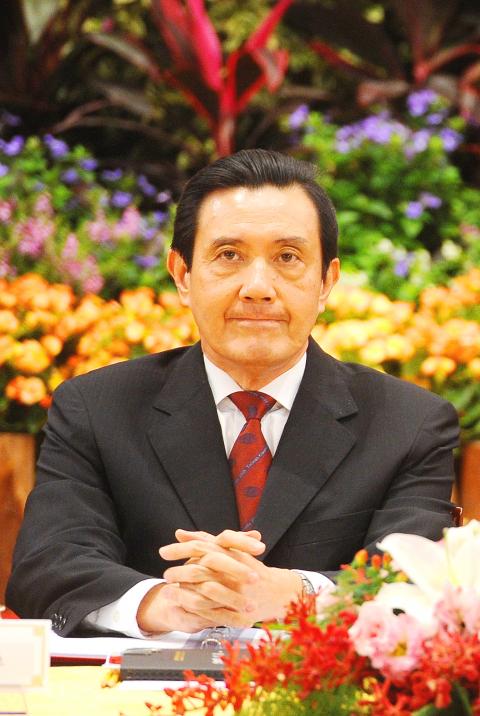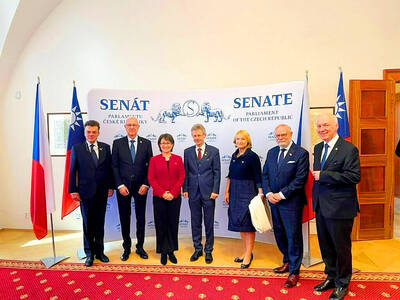President Ma Ying-jeou (馬英九) yesterday said the nation’s loss-plagued pension funds could not and would not go bankrupt, as he pledged to come up with a pragmatic, feasible reform program in January amid complaints by opposition parties about his approach to resolving the problems.
After meeting with Premier Sean Chen (陳冲), Legislative Speaker Wang Jin-pyng (王金平) and Examination Yuan President John Kuan (關中) on the thorny issue, Ma said at a press conference that his administration would tackle the matter in a responsible and cautious manner because many people have a stake in the sustainability of the pension system.
“We’ll address the issue in a transparent and gradual way, with a clear goal, after extensive communications with various social sectors,” Ma said.

Photo: Liu Hsin-de, Taipei Times
He said the major problems with the pension system were insufficient funding and unequal distribution of benefits among different professions and different generations.
An overhaul of the system is necessary and urgent, he said.
“The work may be tough and complex, but we can no longer drag our feet because the flawed system could hurt our fiscal health and affect the well-being of public and private-sector employees, and even society as a whole,” Ma said.
In the meeting between the heads of the three branches of government, decisions were made about the division of responsibilities on pension fund reforms and a timeframe for the overhaul, Ma said.
The Democratic Progressive Party (DPP) accused Ma of enacting “pseudo reform” of various pension programs and criticized his refusal to hold a national affairs conference to resolve the issue.
DPP Chairman Su Tseng-chang (蘇貞昌) reiterated his call for a national affairs conference, which Ma previously turned down, saying that Ma’s plan would be difficult, time-consuming and inefficient.
Ma also omitted mentioning the 18 percent preferential interest rate and the year-end bonuses for retired public servants in his meeting, which made his pledge a “pseudo reform,” DPP Legislator Pan Men-an (潘孟安) told a press conference.
The exclusion of the preferential interest rate and the year-end bonuses would likely create more social instability and conflict between different generations, occupations and social groups, Pan said.
The DPP had reiterated its call for a national affairs conference because it would gather together people from all parts of society for comprehensive discussion on the fiscal problems the country is facing so that Taiwanese could comprehensively deal with their own “fiscal cliff,” Pan said.
In Greater Tainan, former DPP chairperson Tsai Ing-wen (蔡英文) also called on Ma to convene a national affairs conference, adding that Ma’s excuse for refusing to hold one was unacceptable.
Former president Lee Teng-hui (李登輝) called a national affairs conference in 1990 because the legislature was not functioning well and the present situation is very similar to that time, Tsai said, because both the administrative and legislative branches of government have failed to meet challenges and solve problems.
“We need to achieve a consensus on reform now more than ever through a collaboration of all forms of social power, as well as mitigating a potential conflict of interest during the reform process by holding a national affairs conference,” Tsai said.

Two US House of Representatives committees yesterday condemned China’s attempt to orchestrate a crash involving Vice President Hsiao Bi-khim’s (蕭美琴) car when she visited the Czech Republic last year as vice president-elect. Czech local media in March last year reported that a Chinese diplomat had run a red light while following Hsiao’s car from the airport, and Czech intelligence last week told local media that Chinese diplomats and agents had also planned to stage a demonstrative car collision. Hsiao on Saturday shared a Reuters news report on the incident through her account on social media platform X and wrote: “I

SHIFT PRIORITIES: The US should first help Taiwan respond to actions China is already taking, instead of focusing too heavily on deterring a large-scale invasion, an expert said US Air Force leaders on Thursday voiced concerns about the Chinese People’s Liberation Army’s (PLA) missile capabilities and its development of a “kill web,” and said that the US Department of Defense’s budget request for next year prioritizes bolstering defenses in the Indo-Pacific region due to the increasing threat posed by China. US experts said that a full-scale Chinese invasion of Taiwan is risky and unlikely, with Beijing more likely to pursue coercive tactics such as political warfare or blockades to achieve its goals. Senior air force and US Space Force leaders, including US Secretary of the Air Force Troy Meink and

‘BUILDING PARTNERSHIPS’: The US military’s aim is to continue to make any potential Chinese invasion more difficult than it already is, US General Ronald Clark said The likelihood of China invading Taiwan without contest is “very, very small” because the Taiwan Strait is under constant surveillance by multiple countries, a US general has said. General Ronald Clark, commanding officer of US Army Pacific (USARPAC), the US Army’s largest service component command, made the remarks during a dialogue hosted on Friday by Washington-based think tank the Center for Strategic and International Studies. Asked by the event host what the Chinese military has learned from its US counterpart over the years, Clark said that the first lesson is that the skill and will of US service members are “unmatched.” The second

Czech officials have confirmed that Chinese agents surveilled Vice President Hsiao Bi-khim (蕭美琴) during her visit to Prague in March 2024 and planned a collision with her car as part of an “unprecedented” provocation by Beijing in Europe. Czech Military Intelligence learned that their Chinese counterparts attempted to create conditions to carry out a demonstrative incident involving Hsiao, which “did not go beyond the preparation stage,” agency director Petr Bartovsky told Czech Radio in a report yesterday. In addition, a Chinese diplomat ran a red light to maintain surveillance of the Taiwanese